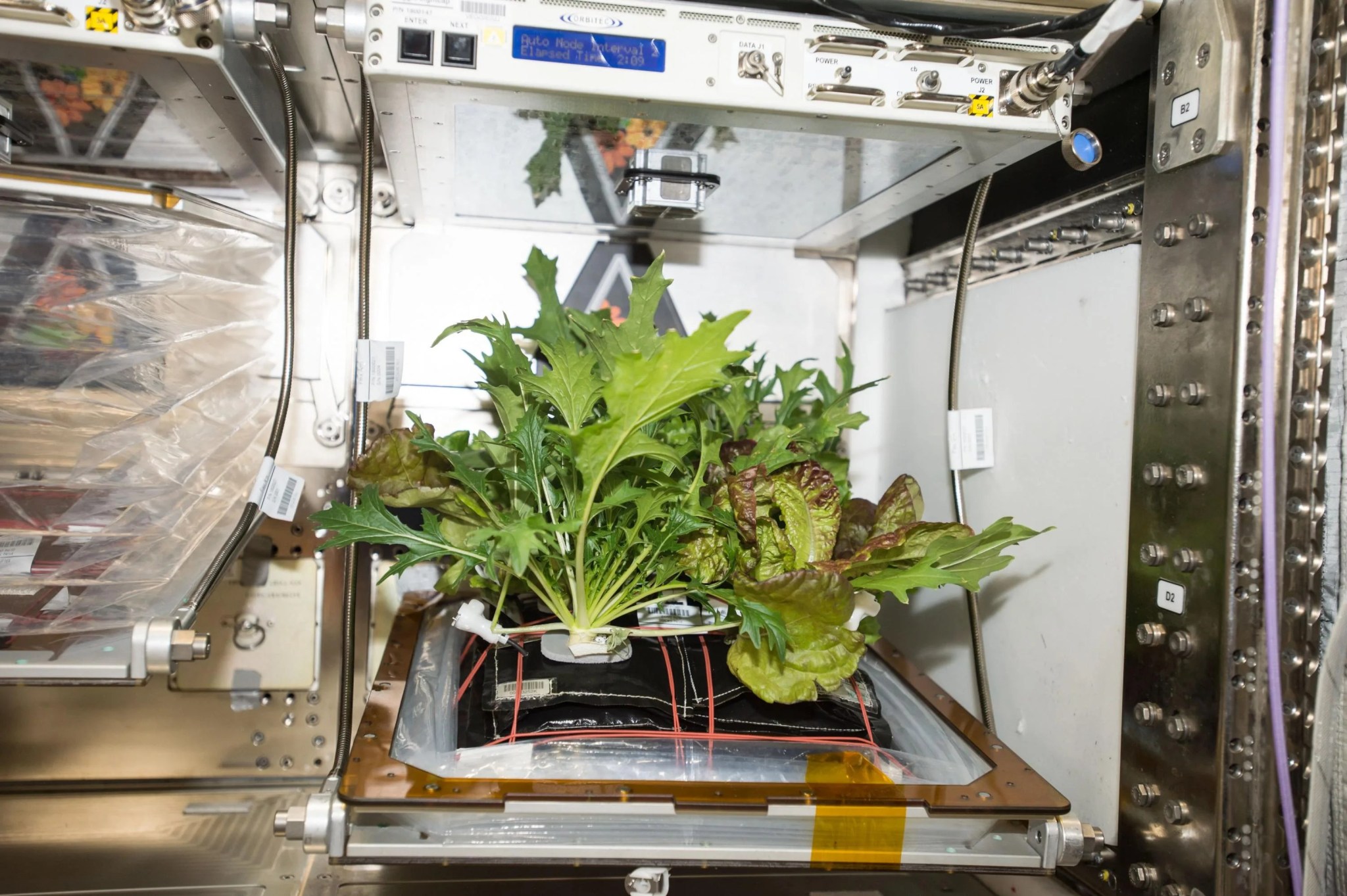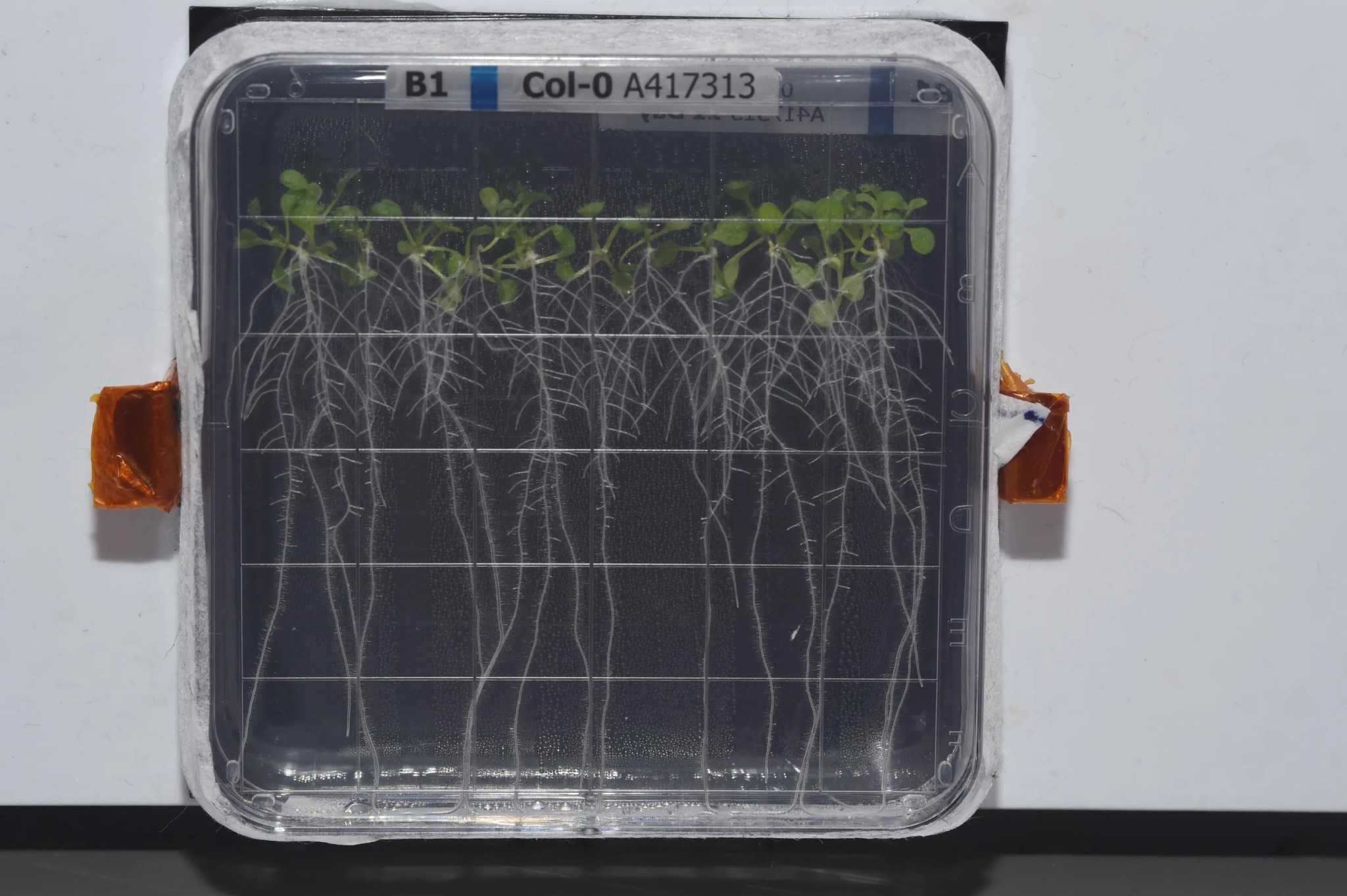Plant Biology Program
Experiments
Plant Habitat-01 (PH-01)
An Integrated Omics Guided Approach to Lignification and Gravitational Responses in Plants
PH-01 is a multi-omic, multi-growth stage plant experiment designed to compare early versus late gene expression in Arabidopsis using the Advanced Plant Habitat (APH) facility. Researchers will look specifically at lignin content—the metabolite in cell walls that strengthens plant stems—using different Arabidopsis strains. We’ll be examining the metabolomics, proteomics, and transcriptomics in the stems and leaves at multiple plant growth time points, then perform an integrated data analysis to correlate lignin content.
Organism: Arabidopsis thaliana wildtype and five mutant strains
Principal Investigator: Norman Lewis, Washington State University (WSU), Pullman, Washington
Instrument: Advanced Plant Habitat
Veggie-PONDS
Veggie Passive Orbital Nutrient Delivery System (PONDS) Hardware Validation
The second set of PONDS units for the Veggie-PONDS hardware validation test will be launched to the ISS aboard OA-9. This set will include six PONDS units (4 opaque and 2 clear with shrouds) seeded with Mizuna mustard. The first set of PONDS units for the Veggie-PONDS hardware validation test launched to the ISS aboard SpX-14 and included six PONDS units (four opaque and two clear with shrouds) seeded with Red Romaine lettuce plus an unseeded clear PONDS unit. The seeded PONDS units will be placed into the Vegetable Production System (Veggie) and the plants will be grown on the ISS for about 30 days. The clear PONDS units with shrouds will be used to visualize water distribution in the reservoir portion throughout the plant growth period.
Organism: Mizuna mustard
Principal Investigator: Howard Levine, Kennedy Space Center, FL
Instrument: Vegetable Production System
VEG-03G, H, I
Growing New Food Plants on ISS
Organisms grow differently in space, from single-celled bacteria to plants and humans. But future long-duration space missions will require crew members to grow their own food, so understanding how plants respond to microgravity is an important step toward that goal. The VEG-03 series of plant growth experiments uses the Vegetable Production System (Veggie) to cultivate a variety of pick-and-eat plants such as lettuce, cabbage, and mustard which are harvested on-orbit then returned to Earth for testing. The SpaceX-15 mission will include the next group of food plants to be tested on the ISS: Dragoon Lettuce, Red Russian Kale, Extra Dwarf Pak Choi, Wasabi Mustard, and Red Romaine Lettuce.
Organism: Dragoon Lettuce, Red Russian Kale, Extra Dwarf Pak Choi, Wasabi Mustard, and Red Romaine Lettuce
Principal Investigator: Matt Romeyn, Kennedy Space Center, FL
Instrument: Vegetable Production System (Veggie)
Event Horizon: Upcoming experiments and studies
Advanced Plant Experiments (APEX)
APEX-05, APEX-06
To examine the effects of the spaceflight environment on biological systems, we conduct a series of Advanced Plant Experiments (APEX) using the Veggie facility onboard the ISS. Our newest payloads, APEX-05 and APEX-06, will look specifically at a dicot plant (Arabidopsis thaliana) and a monocot plant (Brachypodium distachion) to uncover the novel pathways that orchestrate the complex cellular processes by which gravity shapes plant development. We believe knowledge gained from this research will also translate into a deeper mechanistic understanding of the molecular pathways that govern root growth and cell wall development, which in turn will benefit agricultural practices and bioenergy research on Earth.
VEG-04
Pick-and-Eat Salad-Crop Productivity, Nutritional Value, and Acceptability to Supplement the ISS Food System
VEG-04 will use two Veggie facilities in a side-by-side comparison with different lighting intensities for growing Mizuna mustard plants to identify the optimal lighting recipe to grow healthy, abundant crops in space. We will use this information for a follow-up study to grow dwarf tomatoes during VEG-05. As an added benefit, crew members tending to the plants will have the opportunity to consume their own harvests. Mizuna mustard plants will be grown in the ISS Vegetable Production System (Veggie) during the VEG-04 experiment. Mizuna mustard is a vigorous grower that produces spicy flavorful leaves that can be used as a salad green. The “cut-and-come again” harvesting method will be used during the ISS experiment.
Organism: Mizuna mustard
Principal Investigator: Gioia Massa, Kennedy Space Center, Florida
Instrument: Vegetable Production System
Additional Resources
Search NASA Task Book
To learn more about current and upcoming research projects in NASA Space Biology program, search the Task Book: Biological and Physical Sciences Division and Human Research Program. Our online database of research projects includes project descriptions, annual research results, research impacts, and a listing of publications resulting from this NASA-funded research.
Life Sciences Data Archive
A searchable archive of NASA life sciences research is available at the Life Sciences Data Archive
GeneLab Data Repository
Experiments that explore the molecular response of terrestrial biology to spaceflight have generated vast amounts of genomics, proteomics, and metabolomics data that are now publicly available for download from GeneLab.






























